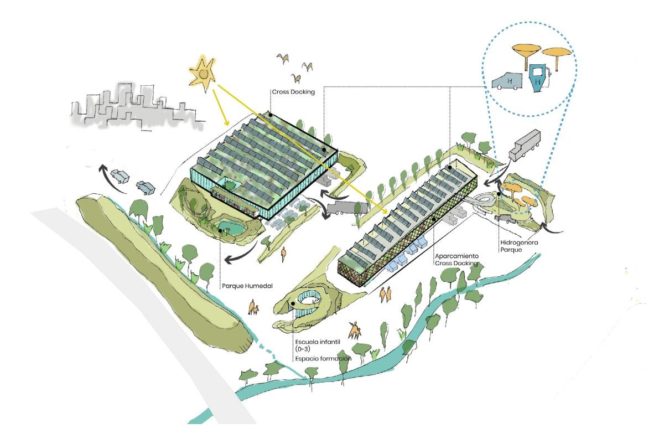On August 23, 2021
Hilife : a sustainable project for reinventing logistics in Madrid – reinventing cities
HiLife is a project developed for Reinventing Cities. It's a next-generation cross-docking platform, for more sustainable logistics.

On August 23, 2021
HiLife is a project developed for Reinventing Cities. It's a next-generation cross-docking platform, for more sustainable logistics.
Reinventing Cities is a competition initiated by the C401 to stimulate the most innovative carbon-neutral developments across the globe. It aims at implementing the best ideas to transform underutilized sites into beacons of sustainability and resiliency. The projects developed act as a showcase for future zero-carbon urban developments.
Firstly, Reinventing Cities will:
Therefore, each Reinventing Cities project should serve as a model for carbon-neutral development. They should demonstrate innovative climate solutions, provide local community benefits and be replicable in cities around the world. The projects showcase how partnerships between cities and the private sector can work together to shape a carbon-neutral, prosperous future.
They must creatively address both content and form, and demonstrate that environmental performances can be achieved in combination with high-quality architecture and community benefits.
HiLife is a project developed by FM Logistic in Spain, for the Reinventing Cities competition. This project should address components such as energy efficiency, sustainable building materials, climate resilience, water management, mobility, waste management, and other components that will lead to a sustainable and carbon-free project.
The area consists of two plots (A and B) of the La Atalayuela estate, in the district of Vallecas Villa, to the south-east of Madrid. Its location next to Mercamadrid and the Villaverde-Vallecas motorway gives it a privileged character in terms of connections with the M-50 and the Henares corridor, the main urban logistics hub in Madrid.

Firstly, for plot A, HiLife proposes an unload, reload and good transfer node, or cross-docking, for urban distribution. It will serve a zero-emission mobility system based on a fleet of small and middle sized delivery vehicles. Hydrogen will 100% fuel the fleet. An on-site photovoltaic installation will generate renewable energy that will produce hydrogen. Interested in green energy and sustainable logistics topics ? Check out our article “How Logistics Company Can Hold A Key To The Transition To Green Energy?” !
In fact, goods will arrive at a receiving dock for big bulk trucks before being sorted out to either B2B or B2C distribution channels. Smaller trucks will deliver B2B products while vans will deliver B2C articles. The photovoltaic rooftop system will cover a great portion of both buildings (12.950m²). It will generate enough 100% renewable energy to fuel all indoor and outdoor activities. It will also serve for the hydrogen production for the delivery vans and other cargo vehicles.
The cross-docking platform area plans to be 14.000 m² (with 1.350 m² for office space) and the outside areas for parking, load and reload at 6.000 m².
The outline for plot A defines two very distinct areas:
Secondly, for plot B, the project propose several interventions :
Between both plots, there will be a 9.000 m² green space. It can serves as a meeting point and leisure area for FM Logistic and nearby workers and neighbors alike.
The building blocks of this program –mixed uses, sustainable mobility, bioclimatic architecture and high quality urban spaces–, all performed from a triple bottom line perspective, should result in the sustainable enhancement of industrial fabric in urban environments.

FM Logistic Group has won the competition and now there is a big challenge ahead : working together with Madrid City Council for a sustainable city and logistics.
How can we help you ?
What are you looking for?
Fill in the form